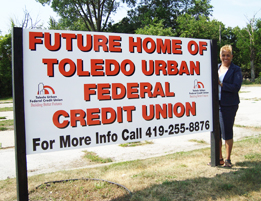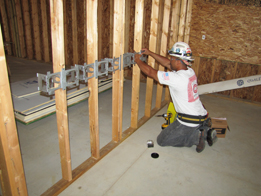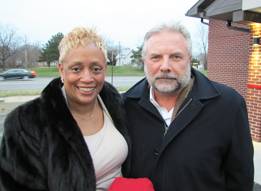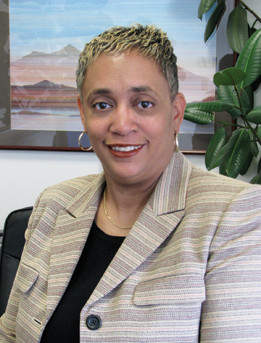
Sojourner’s Truth Staff
One morning in 1996, Suzette Cowell received a phone call from the Friendship Baptist Church. “A brown box had been dropped off and was waiting at the church,” she recalls. “When I picked it up, inside was a charter with no instructions. And we had 30 days to set up shop.”
That charter had been issued by the National Credit Union Administration – the federal government body which oversees and insures credit unions. Cowell had applied for a charter for the Toledo Urban Federal Credit Union with the urging of the Rev. Duane C. Tisdale, pastor of Friendship, and Congresswoman Marcy Kaptur, both of whom wanted to see a strong black-operated credit union in Toledo.
For its part, the NCUA had been less than cooperative. “They said we are people who don’t follow through,” says Cowell.
She did indeed follow through. Even without the assistance of NCUA.
“Nobody came in from NCUA to set it up, so we did the best we could. No one among us has ever said we had run a credit union. Their giving us a brown box was trying to set us up for failure,” says Cowell.
Nevertheless, TUFCU opened its doors for business under the watchful eye of the NCUA. “There were all those audits,” says Cowell. “We didn’t have a lot of capital and what we did have was going for outside auditors and outside attorneys.”
So TUFCU went to the community and managed to raise $184,000 between November 30, 1999 and June 25, 2000.
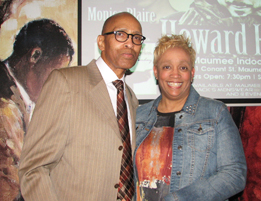
“We had these three deadlines to meet. The first was December 30 when we needed $15,000, and we did it. The next was March 15 and we needed $30,000. But then someone called The Blade. The story they did gave people the impression that everybody’s going to jail. We were damaged and people got scared. But once they understood what was going on, they stood up.
“People started sending money,” she recalls. “Three banks stepped up and made deposits. And with the help of an anonymous donor, we made it. We received a clean bill of health.”
Entities such as the Navy Federal Credit Union headquartered in Virginia, the largest in the country, stepped up and made a deposit. The Ohio Credit Union League, the former Mid-Am Bank and the former Capital Bank all lent a hand. Eventually Fannie Mae called Cowell to talk about doing business together – and TUFCU was off and running.
However, such running was not without stumbles in the first 16 years or so.
The BauerFinancial Inc, a bank research firm that rates credit unions and banks on a scale of zero to five stars based on the institution’s financial criteria, consistently rated TUFCU as substandard with “significant challenges” in those first years.
A one-star rating for a financial institution meant “troubled;” two stars meant “problematic;” three stars meant “adequate.” For five consecutive quarters, however, in 2010-2011, TUFCU received no stars at all – NONE.
Those ratings were the cost of TUFCU fulfilling its mission – its mission of helping individuals of low-to-moderate incomes, small businesses and nonprofit agencies.
However, by the first quarter of 2012, 16 years into its existence and after years of substandard ratings, TUFCU experienced a breakthrough when the institution received a three-star rating from BauerFinancial – an “adequate” grade. The institution had improved its capital reserves to total assets ratio from 3.92 percent in the first quarter of 2011 to 8.06 percent in the first quarter of 2012.
Better news came by the fourth quarter of 2012 when BauerFinancial awarded TUFCU another star moving it into the excellent category.
Still better news was on the way!
Within two and a half years after the financial ratings turned around, TUFCU had finally achieved the goal of raising enough funds to start construction on its own free-standing building. On May 3, 2015 hundreds of credit union members, neighbors, elected officials and supporters gathered to place shovels in the ground and turn a dream into reality.
In a ceremony befitting the faith-based credit union, Bishop Brehon Hall opened with a prayer and Board President Frances Smith – who has been with TUFCU since the beginning – took the attendees through a tour of the history of the institution – the shoebox start, the early years of wandering from building to building.
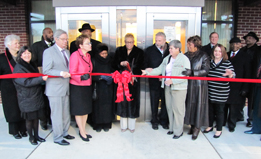
Both Bishop Tisdale and Congresswoman Kaptur were present for the celebration, as was Richard LaValley, president of the Toledo Urban Foundation, who had been so instrumental in raising funds for the new facility.
And on December 20, 2015, the new building at 1441 Dorr Street opened for business. “This is the beginning of a new day,” said Bishop Edward Cook, pastor of New Life C.O.G.I.C. and one of the founding fathers of the Credit Union, as he opened the dedication ceremony for the new 4,200 square-foot facility that offers member three times the space of the old building along with drive through service and ATMS.
The first 25 years of the Toledo Urban Federal Credit Union have meant more than simply a 9 to 5 business operation. Annual banquets, neighborhood parades and 16 years of the African American Festival have also been part of the shared experience for Toledoans.
Suzette Cowell, Frances Smith and Board Member Edwin Mabrey, along with thousands of members have every reason to celebrate the success of the neighborhood institution and this weekend’s Festival is the perfect opportunity for such a celebration.

